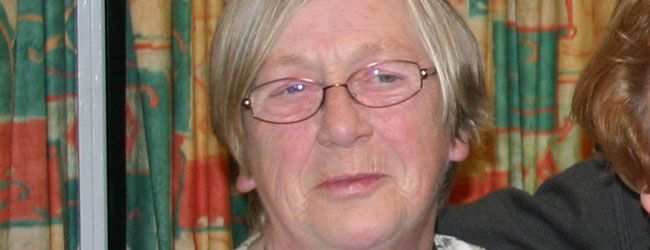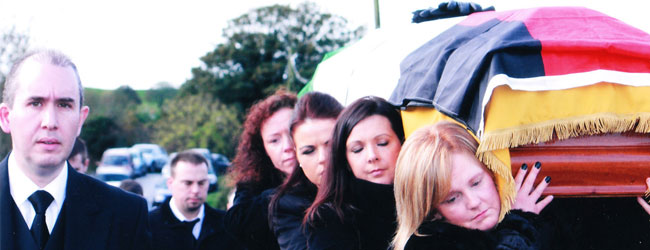3 November 2011
Fógraí Bháis
The obituaries of Peter John Caraher, Rose Doyle and Seamus Loughran
Peter John Caraher
South Armagh
THE lanes and hills of Cullyhanna came to a standstill on Wednesday 12th October when South Armagh said ‘slán abhaile’ to one of its most well-respected leaders, a giant in the republican community, Peter John Caraher, who died the previous Monday morning.
The wake and funeral were attended by thousands of people who wished to pay their own quiet tribute to Peter John and to sympathise with the Caraher family on the loss of a husband, a father, a grandfather and a friend.
Following the funeral ceremony in St Patrick’s Chapel, Cullyhanna, a moving and personal tribute was paid to Peter John by long-time family friend Gerry Adams, who began by extending solidarity to Peter John’s wife, Mary; to their daughters, Maria, Therese and Joanne; and their sons, Francis, John, Miceál, Phelim, and Cathal; to Peter John’s surviving siblings; his 19 grandchildren; the wider Caraher family; and to Peter John’s friends and neighbours.
Gerry outlined Peter John’s background:
“He was born, the eldest of seven children, not far from here on 9th May 1928 on Creenkill Hill, Crossmaglen. His was a republican family. His father, John, a member of the 4th Northern Division, was imprisoned in Newbridge, County Kildare, in the 1920s. He escaped and was recaptured and received such a severe beating that he died at the early age of 44, leaving 14-year-old Peter John as head of the household.
“Peter John went to Kildare to work as a bricklayer and when his brother, Francie, contracted polio he returned home to help with the farm. Francie died in 2005 at the age of 73, a Volunteer of Óglaigh na hÉireann. Another brother, Owen, was imprisoned in 1959 during the ‘50s campaign.
“Peter John married Mary on 4th September 1962 and they had a family of 9 children. Like his father before him, Peter John was a Volunteer in the Irish Republican Army.
“South Armagh in those days was part of the Orange state: oppressed and under British military occupation. It was a very proud republican heartland and Peter John was rightly proud of the actions of the volunteer soldiers of the IRA. In the early years of the conflict he was adjutant to Michael McVerry, who was killed in action while carrying out an attack on Keady Barracks in 1973. Mickey McVerry and Peter John were firm friends and his death had a huge impact on him. There was never a day went by that he didn’t speak of him. The flag on Peter John’s coffin today is the same one that was draped on Mickey McVerry’s coffin.
“In the aftermath of Mickey McVerry’s death, Peter John took on the role of O/C and he instigated the building of the monument to his comrade and friend which was opened a year to the day after his death.
“Peter John was always very keen that people should recognise the central role played by his wife, Mary, and he always valued her opinion and advice.
“The family suffered a great hurt when in December 1990 Fergal and Miceál were the victims of a shoot-to-kill action by the British Army. Fergal was killed and Miceál was severely wounded. Peter John refused to be daunted by this huge personal loss and was instrumental in the setting up of a public inquiry into the events surrounding the shootings.”
Gerry Adams also commended Peter John’s community involvement in groups such as the Pioneer Society, the Lourdes Committee, the Michael McVerry Sinn Féin Cumann, the Cullyhanna Band, Cullyhanna GFC, and South Armagh Green Cross.
Describing the esteem in which Peter John was held, Gerry Adams said:
“He was a giant in our struggle. He was like a tall tree in very turbulent times in the centre of his own family and the republican community.”
In South Armagh we know the legacy which Peter John has bequeathed to us. The vibrant Republican Movement, thriving in our area and our strong communities, are a testament to a proud man who gave 100% to the struggle for unity and freedom.”
Rose Doyle (Stagg)
Mayo and Meath
 ROSE DOYLE (née Stagg) passed away suddenly on 14th September at Our Lady’s Hospital, Navan, after a short illness following her diagnosis of pancreatic cancer. A lifelong, committed republican, she has left behind her husband, James, and her six children: Kevin, Neil, Robert, Trevor, Roisín and Darina.
ROSE DOYLE (née Stagg) passed away suddenly on 14th September at Our Lady’s Hospital, Navan, after a short illness following her diagnosis of pancreatic cancer. A lifelong, committed republican, she has left behind her husband, James, and her six children: Kevin, Neil, Robert, Trevor, Roisín and Darina.
Rose’s brother, Frank Stagg, died on hunger strike on 12th February 1976, in Wakefield Prison in England.
Rose was born on 4th March 1943 in Hollymount, County Mayo, a village halfway between Claremorris and Balinrobe. She was the sixth child of a family of 13 and effectively headed up the younger half of the siblings.
She emigrated to Britain and settled in Coventry, where she became a qualified nurse. In 1961, she met James Doyle, another emigrant, from Killarney, County Kerry. They were married in October 1965 and six children came along thereafter, with the four boys being born in Coventry and both girls born in Trim, County Meath, in the 1970s.
Times were turbulent in the early 1970s for a republican family living in the British Midlands during the IRA campaign. Two County Mayo Hunger Strikers lost their lives in British prisons: Michael Gaughan in 1974 and Frank Stagg in 1976.
Especially difficult for Rose Stagg was that her first daughter was born on 7th February 1976, five days before her brother passed away.
The most distressing of all was when the Fine Gael/Labour Party Government at the time did not hand over the body of Frank Stagg to his family on arrival at Shannon Airport. Instead, against Frank Stagg’s dying wish to be buried in the Republican Plot next to Michael Gaughan, The Government chose to bury him elsewhere in the cemetery, thereby avoiding what they saw as a ‘republican’ funeral. In fact, such was their fear that his dying wish would be carried out, a few days before leaving office in 1977 they arranged for six feet of concrete to be poured over the coffin.
Some 20 months after his burial, a team of six IRA Volunteers in the dead of night carried out Frank’s dying wish. A grave was dug adjacent to where he lay and his coffin moved to the Republican Plot and buried there as he had wished.
Rose Doyle, due to unbearable circumstances, moved from Coventry in April 1975 and settled with her family in Navan, County Meath. Despite difficult financial pressures, she made regular visits to her brother in prison in various prisons all over Britain during 1975.
Rose did not miss one commemoration of the two Mayo Hunger Strikers or indeed the 10 Hunger Strikers from 1981, until this year, when she was too ill to travel.
Her funeral on Saturday 17th September would be one that she would have been proud of. An eight-strong colour guard and a lone piper escorted her remains to St Oliver Plunkett’s Church in Blackcastle, Navan, before burial at the Old Kilcarin Cemetery, Navan. At her graveside, Sinn Féin TD Peadar Tóibín gave a speech on her commitment and steadfast loyalty to the cause of Irish freedom. Her like is a rare breed and due to her support and love, her family will have the fondest memories of her for all time to come.
Seamus Loughran
West Belfast
THE funeral of veteran Belfast republican Seamus Loughran took place on Thursday 29th September. He had passed away the previous Sunday.
Loughran, from Andersonstown, played a central role in republican politics in the early 1970s as the war in the North intensified.
In 1972 during a stand off between the IRA and the British army in Lenadoon, West Belfast, Loughran acted as a go-between. However the situation in the area deteriorated leading to massive gun battles between the IRA and the British which saw the collapse of the 1972 truce. Loughran was later interned and held in the Cages of Long Kesh.
When he was released, the west Belfast man took on various senior roles within the Movement and was part of a delegation of senior republicans who met Protestant clegrymen in Feakle, County Clare, in 1974.
The talks between the then republican leadership figures and the clergymen lead to the IRA instigating its 1975 ceasfire. However due to ill-health Loughran, who was holding down the position as Sinn Féin’s Ulster organiser, resigned.
Speaking to An Phoblacht, Sinn Féin’s Alex Maskey, who knew Seamus Loughran well, praised him as someone “who was ahead of his time politically”. Alex explained:
“Seamus was very prominent in the early 1970s. He was always looking for ways to promote grassroots, community based projects. He was one of the first people I heard encouraging people to set up credit unions and promote the idea of a peoples’ parliament because he was committed to the idea of workers becoming empowered and taking as much control of their lives as possible.
“He wanted the people to be as self-sufficient as they could. He was all for workers rights.”
He described Seamus Loughran as a republican who stood against the injustices he witnessed on the streets of Belfast and throughout the North.
“He came from a very solid Irish family tradition, he loved his family and I would like to take this opportunity to pass on my condolences and those of Sinn Féin to Seamus’s wife Josie, his sons Kieran, Seamus and Brendan and his daughters Christina and Gráinne.”
Follow us on Facebook
An Phoblacht on Twitter
Uncomfortable Conversations

An initiative for dialogue
for reconciliation
— — — — — — —
Contributions from key figures in the churches, academia and wider civic society as well as senior republican figures





